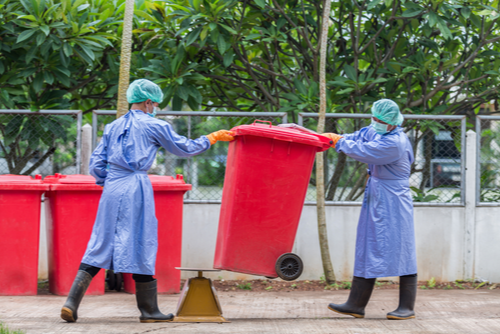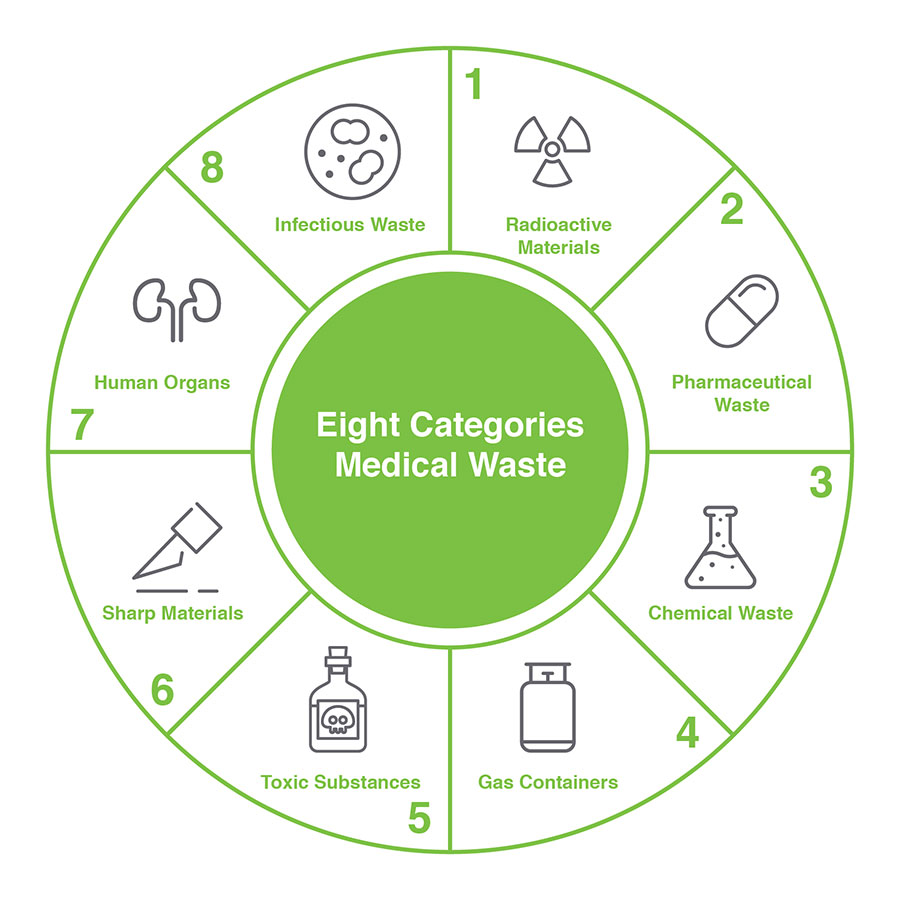Security First: Your Guide to Responsible Medical Waste Removal Services
Wiki Article
Remain Ahead of Regulations: Professional Suggestions on Medical Garbage Disposal
In a world where the health care sector is regularly developing, it is necessary for medical facilities to stay in advance of regulations when it concerns the appropriate disposal of medical waste. With rigid guidelines and frequent governing changes, it can be challenging to browse the complexities of this process. With professional recommendations, facilities can guarantee compliance and mitigate risks linked with improper waste disposal. From understanding the various groups of clinical waste to executing the right collection and partition approaches, this conversation will certainly supply actionable tips and valuable insights to help centers remain ahead of laws in the ever-changing landscape of clinical garbage disposal.Understanding Medical Waste Categories
Recognizing medical waste classifications is vital for proper disposal and administration in medical care facilities. Clinical waste refers to any type of waste created by healthcare tasks that may posture a risk to public wellness or the environment. It is vital to categorize medical waste properly to ensure its risk-free handling, transport, disposal, and therapy.There are a number of groups of medical waste that healthcare centers need to be aware of. One of the most common groups include contagious waste, pathological waste, sharps waste, pharmaceutical waste, and chemical waste. Each classification has details standards and guidelines for its proper management and disposal.
Pathological waste refers to human tissues, body organs, or body components that need special handling and disposal. Pharmaceutical waste comprises expired, extra, or infected medications that need mindful handling and disposal.
Remaining Up-To-Date With Regulatory Modifications
Staying present with regulatory adjustments is critical for medical care facilities to make sure conformity and appropriate administration of medical garbage disposal. medical waste removal near me. With laws regularly progressing, it is important for healthcare centers to stay up-to-date to stay clear of charges, fines, and potential injury to the atmosphere and public healthTo remain ahead of regulatory modifications, healthcare centers should develop a system for surveillance and monitoring updates. This can be done by signing up for governing newsletters, attending seminars and workshops, and proactively joining industry organizations. In addition, facilities should mark an employee or team in charge of remaining educated and distributing details to appropriate stakeholders.
Normal communication with regulative firms is likewise essential. Medical care facilities ought to develop connections with regional, state, and federal agencies to ensure they know any kind of adjustments in policies that may impact their waste administration techniques. This can be done via regular conferences, participation in public comment periods, and aggressive involvement with regulative firms.
Furthermore, health care facilities must consider partnering with waste monitoring companies that focus on medical garbage disposal (medical waste disposal services with WasteX). These firms are frequently skilled in the most recent regulations and can give assistance and support to make sure compliance
Applying Proper Collection and Segregation Methods
To efficiently handle medical garbage disposal, medical care centers have to develop correct collection and partition approaches based on governing standards. Applying these approaches makes certain the secure handling and disposal of possibly unsafe materials, protects the atmosphere, and lessens the danger of infections and injuries to health care workers and the general public.
Correct collection and partition methods entail the usage of assigned containers and identifying systems. Health care facilities ought to provide plainly identified containers for different kinds of medical waste, such as sharps, infectious waste, pharmaceutical waste, and non-hazardous waste. These containers need to be color-coded and plainly marked to stay clear of complication and advertise easy recognition.
In addition, healthcare facilities ought to educate their team on the appropriate procedures for collecting and setting apart clinical waste. This includes informing them on the various types of waste, the appropriate containers to make use of, and the value of complying with guidelines and policies. Regular training sessions and refresher course courses need to be performed to ensure that personnel continue to be updated on ideal methods.
Furthermore, health care facilities must develop a system for routine collection and disposal of medical waste. This might involve partnering with accredited waste management business that concentrate on medical garbage disposal. These companies will make certain that the gathered waste is transported and disposed of in conformity with regulatory demands.
Picking the Right Disposal Methods

Incineration is just one of one of the most effective and typical techniques for taking care of certain sorts of medical waste, such as pathological waste and sharps. It entails the regulated burning of waste at heats, minimizing it to ash. Nevertheless, incineration can launch dangerous pollutants right into the air and add to air pollution.

Other disposal approaches include chemical treatment, microwave therapy, and landfilling. Chemical treatment includes the use of chemicals to decontaminate and look at this now neutralize the waste. her latest blog Microwave therapy utilizes microwave power to warm and decontaminate the waste. Landfilling involves hiding the waste in an assigned land fill area (medical waste disposal services with WasteX). Landfilling ought to be the last resort due to the prospective danger of contamination to dirt and groundwater.
Guaranteeing Compliance Through Paperwork and Training
After carefully thinking about the proper disposal techniques for medical waste, health care facilities must make sure conformity with regulations and decrease environmental impact by implementing effective paperwork and training procedures. This step is crucial in maintaining a sustainable and safe setting for both medical care workers and the general public.
Training is similarly vital in ensuring conformity with guidelines. Health care workers that handle medical waste must obtain ideal training on waste segregation, managing, and disposal treatments. This training needs to cover topics such as the proper use of individual protective devices, identification of different sorts of waste, and the proper disposal techniques for every waste category. By offering detailed training, medical care centers can encourage their personnel to make enlightened choices and decrease the threat of inappropriate garbage disposal.
Conclusion
In conclusion, remaining in advance of guidelines in clinical garbage disposal is vital for health care facilities. medical waste removal services. Comprehending the different groups of clinical waste, remaining updated with governing adjustments, carrying out proper collection and partition approaches, medical waste disposal services with WasteX selecting the suitable disposal methods, and making certain conformity through documents and training are all necessary steps. By following these standards, health care organizations can successfully handle and get rid of of medical waste in a secure and accountable mannerFrom recognizing the different classifications of medical waste to carrying out the best collection and partition techniques, this conversation will give useful insights and workable tips to assist centers stay in advance of regulations in the ever-changing landscape of medical waste disposal. - medical waste disposal services with WasteX
The most common categories include transmittable waste, pathological waste, sharps waste, pharmaceutical waste, and chemical waste. Health care facilities must give plainly labeled containers for various kinds of clinical waste, such as sharps, infectious waste, pharmaceutical waste, and non-hazardous waste. Healthcare facilities ought to establish an extensive system to tape and track all elements of medical waste disposal, including types of waste generated, quantities, and disposal methods made use of. Health care workers who deal with medical waste should receive appropriate training on waste partition, handling, and disposal procedures.
Report this wiki page